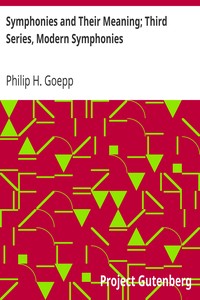Symphonies and Their Meaning; Third Series, Modern Symphonies by Philip H. Goepp
"Symphonies and Their Meaning; Third Series: Modern Symphonies" by Philip H. Goepp is a critical examination of the evolution of symphonic music, particularly focusing on contemporary works from the late 19th and early 20th centuries. Written in the early 20th century, this text reflects on musical trends of its time, discussing how symphonies have responded to and evolved from earlier classical traditions. Goepp explores the nature of modern symphonic compositions, their thematic
and national identities, and the influence of celebrated composers, providing insight into the shifting landscape of orchestral music. At the start of the book, the author sets the stage for a broader discourse on the modern symphony and its cultural implications, emphasizing the importance of critical perspectives in arts appreciation as both a reflection of contemporary sentiments and a guide to the future. He outlines the impact of nationalism on symphonic music and posits that the symphony's vitality lies in its ability to adapt and express the zeitgeist. The opening suggests a rich tapestry of themes to follow, hinting at Goepp's intent to delve into the unique characteristics of the 19th-century symphony, artists like Berlioz and Liszt, and the broader implications of their works within the context of modernity. (This is an automatically generated summary.)
Read or download for free
| How to read | Url | Size | |||
|---|---|---|---|---|---|
| Read now! | https://www.gutenberg.org/ebooks/12903.html.images | 515 kB | |||
| EPUB3 (E-readers incl. Send-to-Kindle) | https://www.gutenberg.org/ebooks/12903.epub3.images | 7.7 MB | |||
| EPUB (older E-readers) | https://www.gutenberg.org/ebooks/12903.epub.images | 7.7 MB | |||
| EPUB (no images, older E-readers) | https://www.gutenberg.org/ebooks/12903.epub.noimages | 248 kB | |||
| Kindle | https://www.gutenberg.org/ebooks/12903.kf8.images | 8.0 MB | |||
| older Kindles | https://www.gutenberg.org/ebooks/12903.kindle.images | 7.9 MB | |||
| Plain Text UTF-8 | https://www.gutenberg.org/ebooks/12903.txt.utf-8 | 423 kB | |||
| Download HTML (zip) | https://www.gutenberg.org/cache/epub/12903/pg12903-h.zip | 7.1 MB | |||
| There may be more files related to this item. | |||||
Similar Books
About this eBook
| Author | Goepp, Philip H. (Philip Henry), 1864-1936 |
|---|---|
| Title | Symphonies and Their Meaning; Third Series, Modern Symphonies |
| Credits | E-text prepared by Juliet Sutherland, Linda Cantoni, and the Project Gutenberg Online Distributed Proofreading Team |
| Reading Level | Reading ease score: 67.9 (8th & 9th grade). Neither easy nor difficult to read. |
| Language | English |
| LoC Class | MT: Music: Musical instruction and study, Composition |
| Subject | Symphonies -- Analysis, appreciation |
| Category | Text |
| EBook-No. | 12903 |
| Release Date | Jul 13, 2004 |
| Most Recently Updated | Dec 15, 2020 |
| Copyright Status | Public domain in the USA. |
| Downloads | 285 downloads in the last 30 days. |
| Project Gutenberg eBooks are always free! | |

